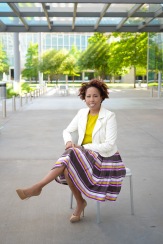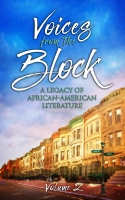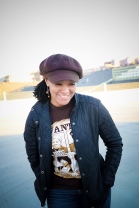Hello one and all! I’m back with the final installation on my series featuring women writers.
For the past few months I have been profiling the women writers who I am blessed to share publishing credit with in volume two of Voices from the Block. I’m not going to say I saved the best for last because all the women are simply amazing. As is Dawn Adams, today’s featured writer. Below is the interview I conducted with Dawn. I am so pleased to share it with you.
- What prompted you to pursue writing as a creative outlet? I was a voracious reader as a kid, so I guess it was rather natural for me to write as well. I was always jotting down thoughts, stories, phrases and poems that popped into my head.
- How do you get in the writing mood? I don’t have any type of ritual. As a matter of fact, I tend to write in spurts. My tag name is Nightwriter, which comes from a habit I have of waking up in the middle of the night and grabbing the notepad and pen on the bedside table and writing. A majority of my works have been sparked around two or three in the morning.
- How do you know when a poem, short story, novel, etc. is “finished?” It varies for me. There are times when I write straight through from concept to completion and I just know it’s done because it came together seamlessly and there is a peace about everything on the page. But there are the times when it comes one line at a time with days, weeks, months and even years in between before it all comes together.
- What or who has been your greatest writing influence? Oh, there’s not just one. There’s Langston Hughes, Zora Neale Hurston, Alice Walker, Maya Angelou, Nikki Giovanni, Stephen King, Carolyne Keene, Dr. Seuss, and the list goes on.
- Do you have a preferred writing form? Poetry, short story, scripts, essays, etc.? Poetry was my first love but I enjoy writing children’s stories and scripts also. I have yet to master the short story; however, I’m working on it.

Dawn Adams
- What are your future writing plans? I have a couple of contemporary adult novels and a children’s book series in the works currently.
- What do you say to people who tell you, “I want to write a book?” Just do it!
- What was your first thought when you held your first published work in your hands? (Silence)
- What was the most challenging thing about the publishing process for you? What was the most rewarding? The most challenging, I think, were the deadlines. I missed a few and had to negotiate additional time. The most rewarding was the feedback, I received. It’s always humbling to hear that something I’ve written has connected with someone in a deep and lasting way.
- How/What do you feel about the future of publishing? We’re in the digital era, which is great. I have Kindle and Nook apps on my phones, computers and tablets, so I understand the convenience and appreciate it. We have access to more content than ever before and from virtually anywhere in the world. But I’m still old school. I love the feel and smell of books, so my hope is that they never go away. When I think about the publishing process, I see self-publishing gaining even more prominence in the industry and becoming the norm. It has lost the stigma that was once attached to it. And in this age, where everyone wants to tell their story their way, self-publishing gives them the control that is not available in the traditional model, and that is encouraging to many would-be authors.
So now you know what I know. Dawn is not only a talented writer but also a poet, editor, trainer, cheerleader, philosopher, yoga practitioner, mother, entrepreneur, and so much more. I guarantee when you read her poetry in Voices you’ll be impressed.
I hope you enjoyed this series on women writers. It certainly put many smiles on my face to present it. If your summer reading list still has an open spot, I ask you to consider adding Voices from the Block. Thank you in advance, and happy reading!








